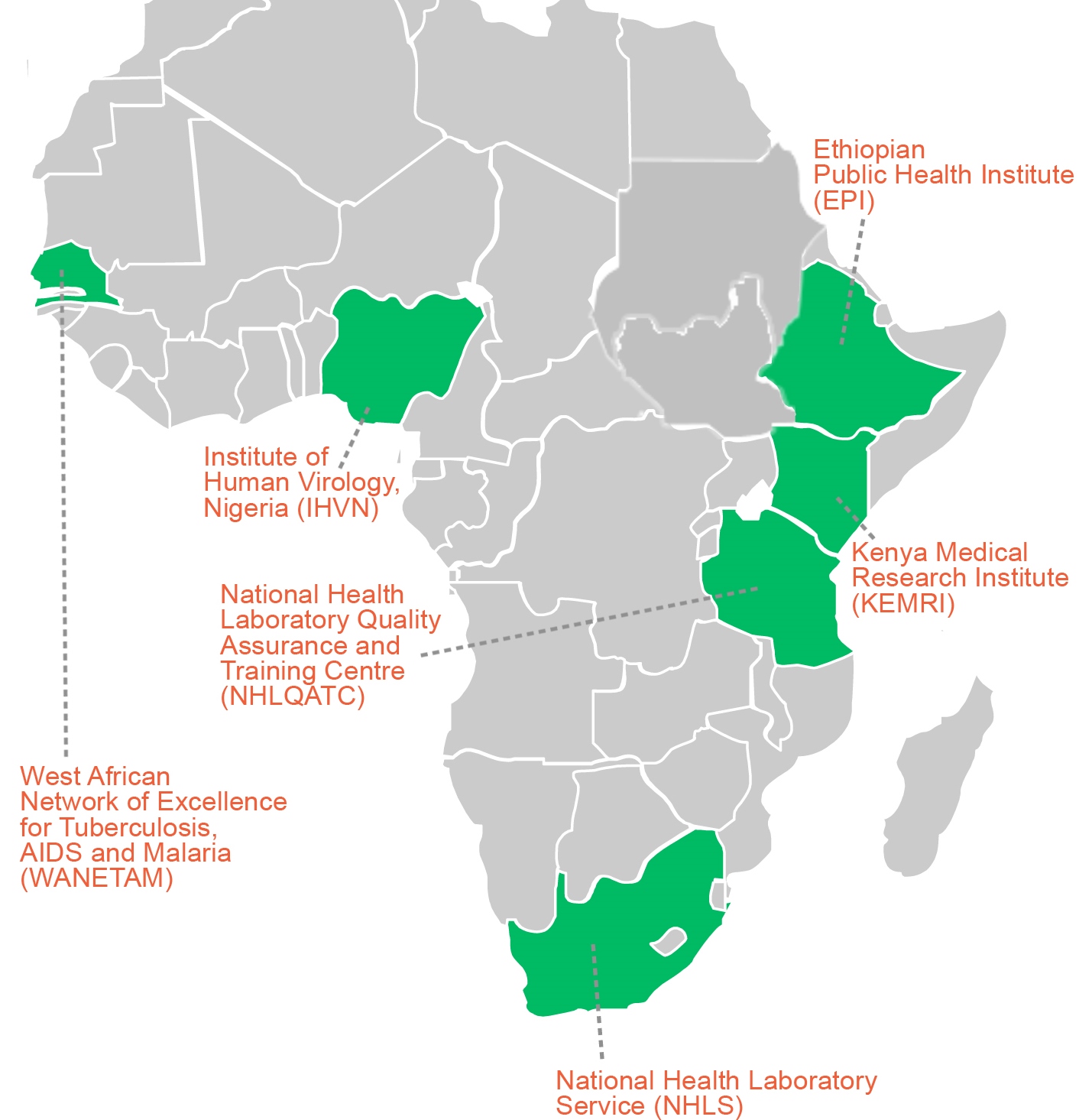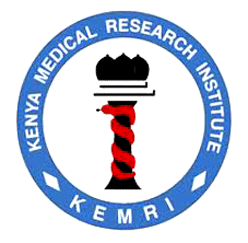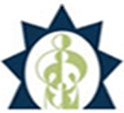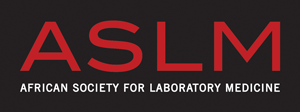ASLM Network of Collaborating Centres
Centres of excellence strengthening laboratory medicine and improving health outcomes in Africa
ASLM’s Network of Collaborating Centres comprise a nucleus of the leading national public health laboratories on the African continent. These Collaborating Centres play a key role in strengthening laboratory medicine and improving health outcomes in Africa by becoming leaders in several important initiatives.

This ASLM laboratory network currently consist of six centres of excellence with a national and international reputation in laboratory medicine, research, policy guidance, technology assessment and implementation, and training, amongst other areas. Three of the centres are accredited to international ISO standards.
Significant opportunities exist for the ASLM network of Collaborating Centres to strengthen laboratory medicine in Africa, including:
- Improving regulatory harmonisation for diagnostics within economic zones. Opportunities exist for the Collaborating Centres to partner in efforts with other agencies to establish regional diagnostics regulatory harmonization. Several groups, including WHO, ASLM, the London School of Hygiene and Tropical Medicine (LSHTM), and others are working on initiatives to build the appropriate political support, create assessment standards etc. The Collaborating Centres can play a key role by conducting evaluations of new technology to produce high quality data for regional regulatory review.
- Establishing a south-south fellowship programme to provide opportunities for promising young laboratory scientists to train, study, and research at centres of excellence for several months at a time. This would promote skills transfer and collaboration between the network of laboratories on the continent and help develop the next generation of laboratory medicine leaders.
- Establishment of an international network of proficiency testing (PT) providers to support SLIPTA and other quality improvement and accreditation programmes. Each Collaborating Centre would be responsible for a different range of PT services as part of a self-sustaining initiative, coordinated by a committee of the Collaborating Centres with a rotating lead.
- Fostering the establishment of the Association/Network of National Public Health Reference Laboratories (NPHL) in Africa. NPHLs play a key role in training, assuring quality and developing laboratory capacity throughout the health care system in their respective countries. Linking these laboratories in a regional network is critical to increase research capacity, quality management systems, disease detection, and sustainability of health programs throughout Africa. Moreover, the regional laboratory network will facilitate South-to-South cooperation and collaboration.
ASLM’s Network of Collaborating Centres:
The Ethiopian Public Health Institute (EPHI), the former Ethiopian Health & Nutrition Research Institute (EHNRI), is a national centre of excellence in providing evidence-based information through research findings; in handling public health emergency management; in conducting health-related surveys and surveillances; and in supporting the national laboratory system. Vaccines and diagnostic production are also important duties. EPHI also provides referral diagnostic and analytical laboratory services; trainings; and promotion of laboratory standards. Its polio and HIV molecular drug resistance and malaria RDTs lot testing laboratories are accredited by the World Health Organization (WHO) and provides laboratory support for the national polio and HIV surveillance programme.
https://www.ephi.gov.et/
 The Kenya Medical Research Institute (KEMRI) is a state corporation established through the Science and Technology (Amendment) Act of 1979 to serve as the national health research body of Kenya. It is affiliated with the United States Centers for Disease Control and Prevention. The KEMRI has two state-of-the-art laboratory facilities accredited by the South African National Accreditation Scheme (SANAS) and ISO-15189, as well as the only research laboratory capable of performing genotypic HIV drug-resistance sequencing. http://www.kemri.org/
The Kenya Medical Research Institute (KEMRI) is a state corporation established through the Science and Technology (Amendment) Act of 1979 to serve as the national health research body of Kenya. It is affiliated with the United States Centers for Disease Control and Prevention. The KEMRI has two state-of-the-art laboratory facilities accredited by the South African National Accreditation Scheme (SANAS) and ISO-15189, as well as the only research laboratory capable of performing genotypic HIV drug-resistance sequencing. http://www.kemri.org/
 The Institute of Human Virology, Nigeria, (IHVN) addresses the development of infrastructure for treatment, prevention and support for people living with and those affected by HIV/AIDS, cancer, tuberculosis, malaria and other diseases in Nigeria. Established in 2004, it also implements the scale-up of the United States President’s Emergency Plan for AIDS Relief (PEPFAR) programme and conducts research and training to promote quality evidence-based health systems strengthening. IHVN has established five (5) regional training laboratories to support indigenous quality assurance; advanced laboratory training; and other specialised activities, such as HIV viral sequencing for drug-resistance. http://ihvnigeria.org/ihvnweb/webnew/
The Institute of Human Virology, Nigeria, (IHVN) addresses the development of infrastructure for treatment, prevention and support for people living with and those affected by HIV/AIDS, cancer, tuberculosis, malaria and other diseases in Nigeria. Established in 2004, it also implements the scale-up of the United States President’s Emergency Plan for AIDS Relief (PEPFAR) programme and conducts research and training to promote quality evidence-based health systems strengthening. IHVN has established five (5) regional training laboratories to support indigenous quality assurance; advanced laboratory training; and other specialised activities, such as HIV viral sequencing for drug-resistance. http://ihvnigeria.org/ihvnweb/webnew/
 The West African Network of Excellence for Tuberculosis, AIDS and Malaria (WANETAM) is a sub-regional conglomeration of Networks of Excellence. It brings together 14 high-profile research institutions from seven West African countries: Burkina Faso, The Gambia, Ghana, Guinea Bissau, Mali, Nigeria and Senegal. The objectives of WANETAM include capacity building, technology transfer and creation of a regional network for scientific collaborations.
The West African Network of Excellence for Tuberculosis, AIDS and Malaria (WANETAM) is a sub-regional conglomeration of Networks of Excellence. It brings together 14 high-profile research institutions from seven West African countries: Burkina Faso, The Gambia, Ghana, Guinea Bissau, Mali, Nigeria and Senegal. The objectives of WANETAM include capacity building, technology transfer and creation of a regional network for scientific collaborations.
 The National Health Laboratory Service (NHLS) is the largest diagnostic pathology service in South Africa with the responsibility of supporting the national and provincial health departments in the delivery of healthcare in all nine (9) provinces. The NHLS provides laboratory and related public health services to over 80% of the population through a national network of laboratories. Its activities comprise diagnostic laboratory services; research; teaching and training; and production of sera for anti-snake venom, reagents and media. Divisions of the NHLS include the National Institute for Communicable Diseases, National Institute for Occupational Health, National Cancer Registry and the South African Vaccine Producers, which houses the Anti-venom Unit. http://www.nhls.ac.za/
The National Health Laboratory Service (NHLS) is the largest diagnostic pathology service in South Africa with the responsibility of supporting the national and provincial health departments in the delivery of healthcare in all nine (9) provinces. The NHLS provides laboratory and related public health services to over 80% of the population through a national network of laboratories. Its activities comprise diagnostic laboratory services; research; teaching and training; and production of sera for anti-snake venom, reagents and media. Divisions of the NHLS include the National Institute for Communicable Diseases, National Institute for Occupational Health, National Cancer Registry and the South African Vaccine Producers, which houses the Anti-venom Unit. http://www.nhls.ac.za/
 The National Health Laboratory Quality Assurance and Training Centre (NHLQATC) supports laboratory public health, quality assurance and training activities in Tanzania. It was established in 2008. Its primary roles are to oversee implementation of laboratory quality management systems; provide technical assistance; train laboratory scientists; and promote and perform standardisation and evaluation of laboratory techniques, methods and equipment in Tanzania.
The National Health Laboratory Quality Assurance and Training Centre (NHLQATC) supports laboratory public health, quality assurance and training activities in Tanzania. It was established in 2008. Its primary roles are to oversee implementation of laboratory quality management systems; provide technical assistance; train laboratory scientists; and promote and perform standardisation and evaluation of laboratory techniques, methods and equipment in Tanzania.


